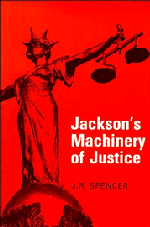Book contents
- Frontmatter
- Contents
- Acknowledgements
- List of figures
- List of tables
- Preface
- Preface to the first edition of ‘The Machinery of Justice in England’
- Abbreviations
- I Historical introduction
- II Civil jurisdiction
- III Tribunals
- IV Criminal jurisdiction
- V The personnel of the law
- 27 Solicitors
- 28 Barristers
- 29 Legal education
- 30 Should the profession continue to be divided into barristers and solicitors?
- 31 Judges
- 32 Juries
- 33 Lay justices and stipendiary magistrates
- 34 The administration of the courts
- VI The European dimension
- VII The cost of the law
- VIII Law Reform
- Appendix A The Report of the Civil Justice Review
- Table of Cases cited
- Table of Statutes cited
- Table of Stationery Office publications cited
- Index
29 - Legal education
Published online by Cambridge University Press: 10 January 2011
- Frontmatter
- Contents
- Acknowledgements
- List of figures
- List of tables
- Preface
- Preface to the first edition of ‘The Machinery of Justice in England’
- Abbreviations
- I Historical introduction
- II Civil jurisdiction
- III Tribunals
- IV Criminal jurisdiction
- V The personnel of the law
- 27 Solicitors
- 28 Barristers
- 29 Legal education
- 30 Should the profession continue to be divided into barristers and solicitors?
- 31 Judges
- 32 Juries
- 33 Lay justices and stipendiary magistrates
- 34 The administration of the courts
- VI The European dimension
- VII The cost of the law
- VIII Law Reform
- Appendix A The Report of the Civil Justice Review
- Table of Cases cited
- Table of Statutes cited
- Table of Stationery Office publications cited
- Index
Summary
Law is taught in this country at different academic levels ranging from university degree standards to the GCSE in schools. First-degree courses in law (or law in conjunction with other subjects) are offered by some thirty universities; the number of university law schools is well over thirty, because four of the colleges within London University have their separate law schools. There are also around two dozen polytechnics which offer CNAA courses that can lead to a degree. Polytechnics and Colleges of Further Education do a vast amount of non-degree law teaching as well, for there are over thirty bodies, including those concerned with accountancy, banking, business and various kinds of administration, which have law papers as part of their examinations, and law courses are needed for these. The Inns of Court Law School, which is controlled by the Council of Legal Education, is concerned solely with teaching for Bar examinations, and the College of Law (controlled by the Law Society) prepares students for the Law Society examinations. Neither of these organisations teach law for other purposes (but polytechnics also teach for some of the legal professional examinations of the Bar and of the Law Society).
In other countries an essential part of the education and training of lawyers has always been taking a degree in law.
- Type
- Chapter
- Information
- Jackson's Machinery of Justice , pp. 345 - 352Publisher: Cambridge University PressPrint publication year: 1989

